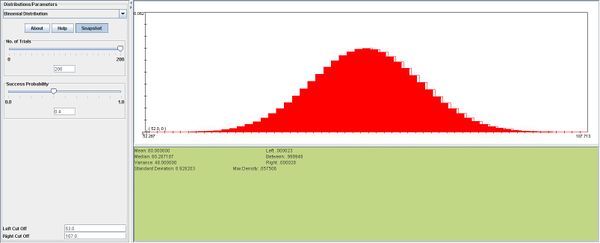Difference between revisions of "SOCR EduMaterials Activities Discrete Probability examples"
Create90215 (talk | contribs) |
Create90215 (talk | contribs) |
||
| Line 16: | Line 16: | ||
If the probabilities of having a male or female offspring are both 0.50, find the probability that a familiy's fifth child is their first son. | If the probabilities of having a male or female offspring are both 0.50, find the probability that a familiy's fifth child is their first son. | ||
* '''Answer:''' | * '''Answer:''' | ||
| − | *<math>P(X=5)= 0.50^5=0.03125</math> | + | *<math> X \sim geometric(0.5) </math><math>P(X=5)= 0.50^5=0.03125</math> |
<center>[[Image: SOCR_Activities_Binomial_Christou_example2.jpg|600px]]</center> | <center>[[Image: SOCR_Activities_Binomial_Christou_example2.jpg|600px]]</center> | ||
* '''Example 3:''' | * '''Example 3:''' | ||
| Line 28: | Line 28: | ||
<center>[[Image: SOCR_Activities_Binomial_Christou_example3_2nd.jpg|600px]]</center> | <center>[[Image: SOCR_Activities_Binomial_Christou_example3_2nd.jpg|600px]]</center> | ||
* '''Example 4:''' | * '''Example 4:''' | ||
| − | * <math>P(X=5)=0.7^4 0.3=0.07203</math> where X represents the number of trials. | + | * <math> X \sim geometric(0.3) </math><math>P(X=5)=0.7^4 0.3=0.07203</math> where X represents the number of trials. |
<center>[[Image: SOCR_Activities_Binomial_Christou_example4.jpg|600px]]</center> | <center>[[Image: SOCR_Activities_Binomial_Christou_example4.jpg|600px]]</center> | ||
* '''Example 5:''' | * '''Example 5:''' | ||
| Line 58: | Line 58: | ||
* '''Answer:''' | * '''Answer:''' | ||
| − | **a. <math>P(X=3)=0.4 \times 0.4 \times 0.6=0.096</math><center>[[Image: SOCR_Activities_Binomial_Christou_example8_a.jpg|600px]]</center> | + | **a. <math> X \sim geometric(0.6) </math><math>P(X=3)=0.4 \times 0.4 \times 0.6=0.096</math><center>[[Image: SOCR_Activities_Binomial_Christou_example8_a.jpg|600px]]</center> |
**b. Let's first find the probability that at least 3 people will NOT have to be interviewed to encounter the first case. | **b. Let's first find the probability that at least 3 people will NOT have to be interviewed to encounter the first case. | ||
<math>P(X=1) + P(X=2) = 0.6+0.4 \times 0.6 = 0.84</math> | <math>P(X=1) + P(X=2) = 0.6+0.4 \times 0.6 = 0.84</math> | ||
| Line 70: | Line 70: | ||
<center>[[Image: SOCR_Activities_Binomial_Christou_example9_a.jpg|600px]]</center> | <center>[[Image: SOCR_Activities_Binomial_Christou_example9_a.jpg|600px]]</center> | ||
**b. In this part we will look at every group of 5 people as one unit. We will denote success as the event that all 5 people in a group prefer the new product, and failure as the event that at least one person in a group does not prefer the new product. Therefore, <math>p=0.01024</math>. So, | **b. In this part we will look at every group of 5 people as one unit. We will denote success as the event that all 5 people in a group prefer the new product, and failure as the event that at least one person in a group does not prefer the new product. Therefore, <math>p=0.01024</math>. So, | ||
| − | <math>P(X=60)= (1-.01024)^60 = 53.9%</math> | + | <math> X \sim geometric(0.01024) </math><math>P(X=60)= (1-.01024)^60 = 53.9%</math> |
*Below you can see a SOCR snapshot for this example: | *Below you can see a SOCR snapshot for this example: | ||
<center>[[Image: SOCR_Activities_Binomial_Christou_example9_b.jpg|600px]]</center> | <center>[[Image: SOCR_Activities_Binomial_Christou_example9_b.jpg|600px]]</center> | ||
Revision as of 16:44, 30 April 2007
- Description: You can access the applets for the distributions at http://www.socr.ucla.edu/htmls/SOCR_Distributions.html .
- Example 1:
Find the probability that 3 out of 8 plants will survive a frost, given that any such plant will survive a frost with probability of 0.30. Also, find the probability that at least 1 out of 8 will survive a frost. What is the expected value and standard deviation of the number of plants that survive the frost?
- Answer:
- \( X \sim b(8,0.3) \), \( P(X=3)= {8 \choose 3} 0.3^30.7^5=0.2541\)
- \( P(X \ge 1)=1-P(X=0)=1-.7^8=0.942\)
- \( E(X) = np = 8 \times 0.3=2.4 \)
- \( Sd(X)= \sqrt{npq}=\sqrt{8\times 0.30 \times 0.70}=1.3\)
Below you can see SOCR snapshots for this example:
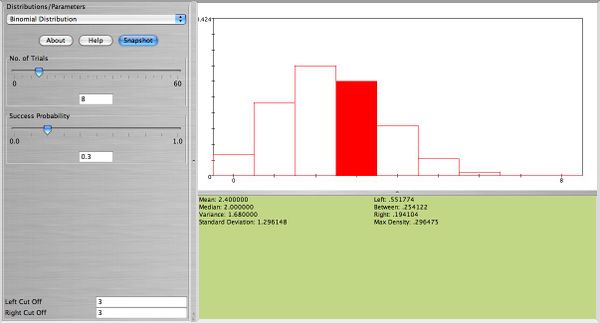

- Example 2:
If the probabilities of having a male or female offspring are both 0.50, find the probability that a familiy's fifth child is their first son.
- Answer:
- \( X \sim geometric(0.5) \)\(P(X=5)= 0.50^5=0.03125\)
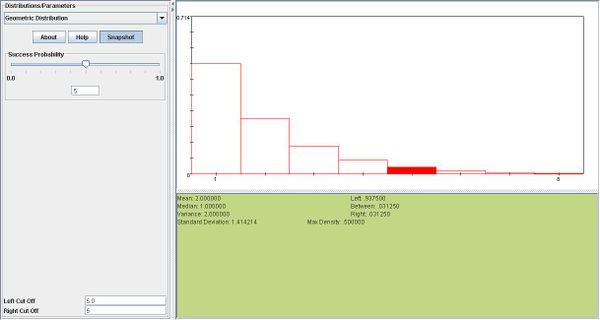
- Example 3:
A complex electronic system is built with a certain number of backup components in its subsystem. One subsystem has 4 identical components, each with probability of 0.20 of failing in less than 1000 hours. The subsystem will operate if at least 2 of the 4 components are operating. Assume the components operate independently.
- Answer:
- a. Find the probability that exactly 2 of the 4 components last longer than 1000 hours.
- b. Find the probability that the subsystem operates longer than 1000 hours.
- a. \(X \sim b(4,0.8) \), \( P(X=2)= {4 \choose 2} 0.8^2 0.2^2=0.1536\)
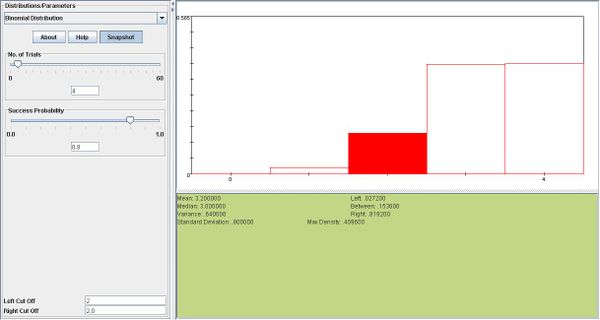
- b. \(P(X\ge 2)= {4 \choose 2} 0.8^2 0.2^2+{4 \choose 3} 0.8^3 0.2^1+{4 \choose 4} 0.8^4=0.9728\)

- Example 4:
- \( X \sim geometric(0.3) \)\(P(X=5)=0.7^4 0.3=0.07203\) where X represents the number of trials.

- Example 5:
\( E(X)=\frac{1}{p}=\frac{1}{0.30}=3.33\)
- Example 6:
- a. \(X \sim b(5,0.90). P(X=4)= {5 \choose 4} 0.9^4 0.1^1=0.32805\)

- \(P(X\ge 1)= 1-P(X=0)= 1- 0.1^4=0.9999\)

- b. \(P(X=0)=.001, 0.001= 0.1^n n= 3.\)
- In the first snapshot below, where\(n=2, P(X\ge1)=0.99,\) which is too small. In the second snapshot, we can see that when n is increased to 3, \(P(X\ge1)\) increases to nearly 1.
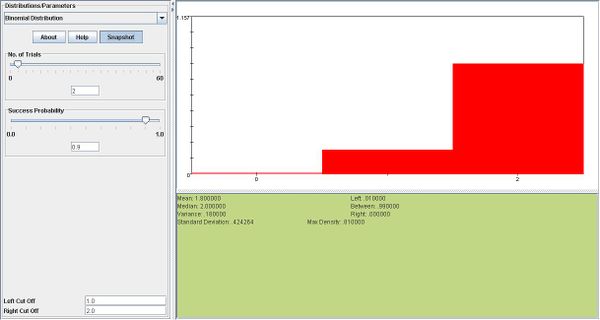

- Example 7:
Construct a probability histogram for the binomial probability distribution for each of the following: n=5,p=0.1, n=5,p=0.5, m=5,n=0.9. What do you observe? Explain.
- Answer:
We observe that if p=0.5 the distribution resembles the normal distribution, with mean \(np=0.25\). Values above and below the mean are distributed symmetrically around the mean. Also, the probability histograms for p=0.1 and p=0.9 are mirror images of each other.

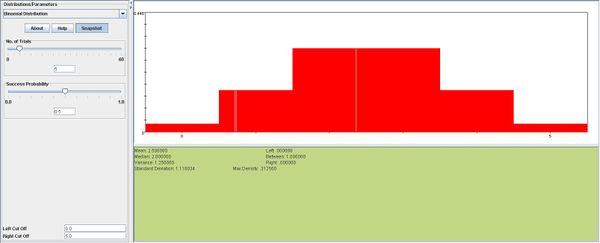
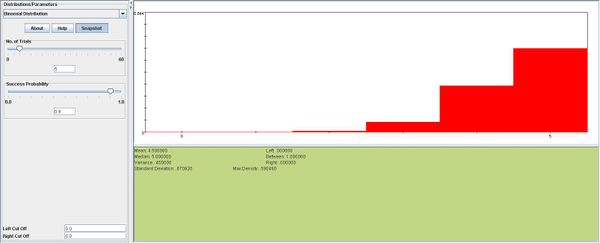
- Example 8:
On a population of consumers, 60% prefer a certain brand of ice cream. If consumers are randomly selected,
- a. what is the probability that exactly 3 people have to be interviewed to encounter the first consumer who prefers this brand of ice cream?
- b. what is the probability that at least 3 people have to be interviewed to encounter the first consumer who prefers this brand of ice cream?
- Answer:
\(P(X=1) + P(X=2) = 0.6+0.4 \times 0.6 = 0.84\)
- Now we subtract this from 1 to find the complement, which is the event that at least 3 people WILL have to be interviewed to find the first case\[1-0.84= 0.16\]

- Example 9:
The alpha marketing research company employs consumer panels to explore preferences
- Answer:
- a. \( X \sim b(5,0.4) \), \( P(X=5)= {5 \choose 5} 0.4^5 0.6^0=0.01024\)

- b. In this part we will look at every group of 5 people as one unit. We will denote success as the event that all 5 people in a group prefer the new product, and failure as the event that at least one person in a group does not prefer the new product. Therefore, \(p=0.01024\). So,
\( X \sim geometric(0.01024) \)\(P(X=60)= (1-.01024)^60 = 53.9%\)
- Below you can see a SOCR snapshot for this example:

- Example 10:
- Answer:
- a. We will denote the number of unbruised peaches in our first selection X, and the number of unbruised peaches in our second selection Y. \(P(shipment=A)=\)P(all four peaches are unbruised)+P(three of the peaches are unbruised) X P(four additional peaches are unbruised)= \(P(X=4)+P(X=3)\times P(Y=4).\)
- \( X \sim b(4,0.9) \), \( P(X=4)= {4 \choose 4} 0.9^4 0.1^0= 0.6561\)
- \( Y \sim b(4,0.9) \), \( P(Y=3)= {4 \choose 3} 0.9^3 0.1^1= 0.2916\)
- \( Y \sim b(4,0.9) \), \( P(Y=4)= {4 \choose 4} 0.9^4 0.1^0= 0.6561\)
Therefore, \(P(shipment=A)=0.6561+ (0.2916)(0.6561)=0.8474 <center>[[Image: SOCR_Activities_Binomial_Christou_example10_a.jpg|600px]]</center> *b.<math>P(Shipment=C)=\)P(three of the first four peaches are unbruised) X P(zero or one of the additional four peaches are unbruised) +P(two or fewer of the first four peaches are unbruised). The first selection of peaches = X. The second selection=Y.
- \( X \sim b(4,0.9) \), \( P(X=3)= {4 \choose 3} 0.9^3 0.1^1= 0.2916\)
- \( Y \sim b(4,0.9) \), \( P(Y=0)= {4 \choose 0} 0.9^0 0.1^4= 0.0001\)
- \(P(Y=1)={4 \choose 1} 0.9^1 0.1^3=0.0009\)
Therefore \(P(Y=0 or 1) = 0.0001+.0009=0.001.\)
- \(P(X\le2)=P(X=0)+P(X=1)+P(X=2)= {4 \choose 0} 0.9^0 0.1^4 + {4 \choose 1} 0.9^1 0.1^3+{4 \choose 2} 0.9^2 0.1^2= 0.0523\)
Therefore P(shipment=C)=\((0.2916 \times 0.001)+.0523 = 0.052\)
- Example 11:
- Answer:
- a. We want our system to function, so we would prefer a system with the highest probability of operating. A system will operate if at least half of its components function.
- If n=3, P(functioning when n=3)=\(P(X\ge 2). \)
\(X \sim b(3,0.40). P(X \ge2)= P(X=2)+P(X=3)= {3 \choose 2} 0.4^2 0.6^1+{3 \choose 3} 0.4^3 0.6^0= 0.352\)

- If n=5, P(functioning when n=5)=\(P(X\ge 3). \)
\(X \sim b(5,0.40). P(X \ge3)= P(X=3)+P(X=4)+P(X=5)= {5 \choose 3} 0.4^3 0.6^2+{5 \choose 4} 0.4^4 0.6^1+{5 \choose 5} 0.4^5 0.6^0=0.31744\)

- Therefore it is better to have 3 components, because we will have a better chance of having a system that operates.
- b. Again, \(X \sim b(200,0.40).\) mean=expected value = \(np=200 \times 0.4 = 80; SD=\sqrt{npq}=\sqrt{200 \times 0.4 \times 0.5}=6.3245\)
